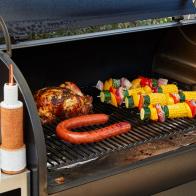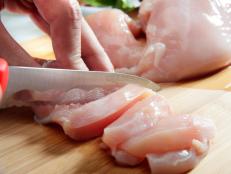How to Deal With Food Poisoning
Steps you can take when you get food poisoning and how to prevent it from happening.

elenaleonova
You’ve had those uncomfortable symptoms after unknowingly eating tainted food: nausea, vomiting, diarrhea, dehydration and stomach cramps. Food poisoning can certainly knock you out and keep you in bed for 24 hours or even days. In some cases it can also lead to other health consequences like kidney issues or liver failure. The Centers for Disease Control and Prevention (CDC) estimated that every year 48 million people get sick from food poisoning with 128,000 being hospitalized and 3,000 dying. But how should you deal with food poisoning when it hits? Here’s a look into what food poisoning is and steps you should take if you become ill.
What Is Food Poisoning?
There are a variety of disease-causing germs that can contaminate food. Researchers have identified over 250 foodborne diseases, which are mainly bacteria, viruses and parasites. After you ingest a food or drink that’s contaminated, it can take hours or even days before you have any symptoms, so can be hard to figure out where it came from.
Common symptoms of foodborne illness (AKA food poisoning) include upset stomach, fever, nausea, vomiting, diarrhea and stomach cramps, but can be different depending on the type of disease. On occasion, symptoms can be severe and even life-threatening.
Foodborne illness can affect anyone, but some groups of people are more likely to get them including pregnant and lactating women, young children, older adults and those with a weakened immune system due to illnesses like diabetes, kidney disease, organ transplants or liver disease. Most folks who get a bout of foodborne illness get better without seeing a doctor, but there are times when it’s recommended to seek medical attention.
What to Do When You Are Sick
If you experience symptoms of foodborne illness, like diarrhea or vomiting, it’s important to drink plenty of fluids to prevent dehydration. Good old water can do the trick, but you can also suck on ice chips or ice pops to take in small amounts of fluids. Water may not always be enough as you lose electrolytes when you have vomiting and diarrhea, so drinking an electrolyte beverage may be called for. At home this may mean sipping on a sports drink like Gatorade which provides sodium and potassium which the body is losing.
Sometimes you may become so weak and ill that it’s time to seek medical attention. The CDC recommends seeking medical attention if you exhibit any of the following symptoms:
- Blood in stools
- A high fever of over 102 degrees F, measured orally
- Frequent vomiting that you can’t keep any liquids down (this can lead to dehydration)
- Signs of dehydration like a significant decrease in urination, a very dry mouth and throat, or feeling dizzy when you stand up.
- Diarrhea that lasts more than 3 days
If you aren’t sure if you need medical attention, it’s always better to be safe and call your doctor or go to your local emergency room.
How to Prevent Food Poisoning
There are several four simple steps you can follow to help reduce the risk of food poisoning.
1) Clean: It’s important to wash your hands often. The disease-causing germs can survive in many places and can be spread around your kitchen. When washing your hands, lather at least 20 seconds with soap and water before, during, and after preparing food and before eating. Also, wash anything that comes into contact with food including utensils, cutting boards and counter tops with hot soapy water. Fresh fruits and vegetables should be washed under running water.
2) Separate: Minimize cross-contamination in your kitchen by keeping raw meat, poultry, seafood and eggs separate from ready-to-eat foods. To do so, use separate cutting boards and plates for raw meat, poultry and seafood. When food shopping, keep the raw meat, poultry and seafood away from ready-to-eat foods. You should even pack them in separate bags. When storing raw meat, poultry, seafood and eggs in your refrigerator, keep them separate from other foods.
3) Cook: Make sure to cook raw foods to the correct minimum internal temperature so the germs that make you sick are destroyed. The only sure way to tell if a food is safely cooked is to use a thermometer. You cannot tell if a food is safely cooked by looking at the color of the food, or checking if the juices are running clear.
General cooking guidelines for foods are the following:
- Whole cuts of beef, pork, veal and lamb: 145 degrees F
- Ground meats, like beef and pork: 160 degrees F
- Poultry, including ground chicken and turkey: 165 degrees F
- Leftovers and casseroles: 165 degrees F
- Fresh (raw) ham: 145 degrees F
- Fish: 145 degrees F
4) Chill: Always remember to refrigerate foods immediately when not using. Keep your refrigerator set below 40 degrees F. Any perishable food should be refrigerated within 2 hours. If the temperature outside is above 90 degrees F, then refrigerate within 1 hour.
If you are thawing frozen food, do so in the refrigerator, in the microwave, or in cold water. Never let frozen food thaw on the counter as bacteria multiply very rapidly at room temperature — enough to get you sick, even if you cook your food properly.
Toby Amidor, MS, RD, CDN, is a registered dietitian and consultant who specializes in food safety and culinary nutrition. She is the author of The Greek Yogurt Kitchen: More Than 130 Delicious, Healthy Recipes for Every Meal of the Day.
*This article was written and/or reviewed by an independent registered dietitian nutritionist.
Related Links:
































